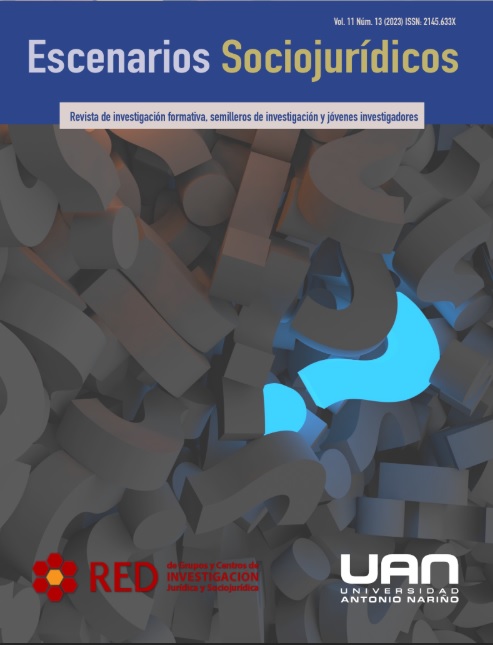Conciencia ambiental universitaria: Estrategias participativas y académicas para una educación consciente, responsable, legal y sostenible en la Universidad del Sinú.
Abstract
Environmental education emerges as a dynamic and continuous process that goes beyond the mere acquisition of knowledge, encompassing the awareness, values, and actions necessary to address current environmental challenges. In the university context, its importance lies in the formation of conscious citizens committed to environmental preservation.
This presentation is the product of a project designed to promote an environmental culture at the University of Sinú, Cartagena Branch, focusing on solid waste management. It proposes an effective integration of environmental education with legal knowledge, leveraging existing legislation, such as Law 1259 of 2008 and Law 99 of 1993, to support and guide actions in favor of the environment.
It is important to note that this article is the result of a research project that began in late 2024. Therefore, the conclusions presented at this time are provisional. The results will include progress made in the bibliographic review or the state of the art related to the research and presentation topic.
Discussing the environment is essential, especially in a country like Colombia, where the human right to a risk-free, clean, healthy, and sustainable environment is recognized. This right is not only fundamental in itself but also crucial for the exercise of other rights, given its close connection with the right to life, respect for human dignity, and the conservation of nature and ecosystems (United Nations, 2022).
Downloads
References
Ariza Santamaría, R. (Octubre de 2008). Hacía sistemas jurídicos plurales . TEORIA Y PRACTICA EN EL EJERCICIO DE LA JURISDICCION ESPECIAL INDIGENA COLOMBIANA. Bogotá, Colombia: KONRAD ADEAUER STIFTUNG e. V.
Berche, A. S., García, A. M., & Mantilla, A. (Mayo de 2006). Pueblos indígenas, ¿sujetos de derecho en el escenario internacional? Bogotá, Colombia: Colección de textos aquí y ahora. 1ra Edición: ILSA.
Borello, R. (2001). XV Jornadas Argentinas de Filosofia Jurídica y Social. Asociación Argentina de Filosofia del Derecho. Sobre el pluralismo jurídico. Rosario, Santa fe, Argentina.
Constitución Politica de Colombia, Constitución de 1991 (Asamblea Nacional Constituyente 20 de Julio de 1991).
Corte Constitucional. (s.f.). SU -510 de 1998.
Culasso, M. F., & Avila, H. O. (s.f.). ANALISIS DE LA APERTURAAL PLURALISMO JURÍDICO EN LA REGULACIÓN DEL DERECHO DE PROPIEDAD COMUNITARIA DE LOS PUEBLOS ORIGINARIOS CONFORME A LA C.N. 1994 Y SU IMPACTO EN EL DERECHO PRIVADO POSITIVO . Buenos Aires,
Argentina: Universidad Nacional del Rosario.
Díaz, C. G. (s.f.). C-139 de 1996. Corte Constitucional. Diaz, C. G. (s.f.). T-349 de 1996. Corte Constitucional.
Gunther, K. (2003). Anuario de Derechos Humanos. Pluralismo Juridico y Codigo Universal de la Legalidad: la legalización como problema de Teoría del Derecho. Nueva Epoca.
Ley, Ley 720 de 2001 (Congreso De La República 24 de diciembre de 2001). Ley, Ley 1259 de 2008 (Congreso de la República 19 de diciembre de 2008).
Rosario, U. d. (s,f de s,f de 2010). editorial.urosario. Obtenido de editorial.urosario.: https://editorial.urosario.edu.co/pageflip/acceso-abierto/el-medio-ambiente- sano.pdf
Rueda, E. C. (2008). Hacia sistemas jurídicos pluralistas. PRINCIPIOS GENERALES DEL DERECHO INDIGENA, 294. Bogota, Colombia: KONRAD ADENAUER STIFTUNG e. V.
Santos, B. d. (s.f.). Globalización del Derecho.
Sentencia , SU-1116 de 2001 (Corte Constitucional 24 de octubre de 2001).
Unidas, N. (s,f de s,f de 2022). acnudh.org. Obtenido de acnudh.org: https://acnudh.org/wp-content/uploads/2022/02/12-El-derecho-humano-a-un- medio-ambiente-sin-riesgos-limpio-saludable-y-sostenible.pdf
Downloads
Published
-
Abstract92
-
PDF (Español)38
How to Cite
License
Copyright (c) 2025 Camila Medellín Sibaja

This work is licensed under a Creative Commons Attribution-NonCommercial-ShareAlike 4.0 International License.


 Portal de Ciencia Abierta
Portal de Ciencia Abierta